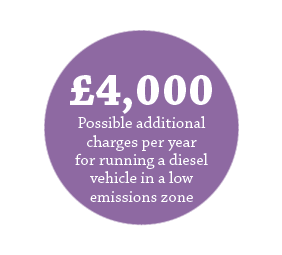New emissions standards make electric vehicles look increasingly attractive. But other factors are also important, says Joseph Lee
When it comes to choosing commercial vehicles, the decision used to be all about considerations such as capacity, cargo type and weight.
Those factors are as important as ever, but now you also have to contend with alternative fuel sources and changing environmental regulations.
 Kris Cholmondeley, head of business sales at Citroën, says “deciding what power option is best” is the biggest challenge you will face with your fleet over the next year. “For local distribution, electric vehicles offer an alternative with zero tailpipe emissions and low refuelling costs.”
Kris Cholmondeley, head of business sales at Citroën, says “deciding what power option is best” is the biggest challenge you will face with your fleet over the next year. “For local distribution, electric vehicles offer an alternative with zero tailpipe emissions and low refuelling costs.”
Recent and forthcoming changes are likely to make diesel more expensive and electric power cheaper, too. In 2016, the government extended its subsidy for electric vehicles of up to £20,000 to trucks heavier than 3.5 tonnes, as well as to small vans. It is now consulting on moving van vehicle excise duty to being based on emissions, as it is with cars.
In addition, cities are introducing low emissions zones like the one in London, where diesel vehicles face charges. Leeds will soon follow suit.
Bill Laidlaw, dealer development manager at LDV, says: “When you are buying a vehicle now, you have to think hard about how long you will keep it. Will you be working in a low emissions zone in five years’ time? It could cost you £3,000 to £4,000 a year in emissions charges, if so.”
He suggests a new electric vehicle may have a larger upfront cost than a diesel vehicle, but a full charge can cost as little as £3 and it is likely to hold its value much more than older, second-hand diesels, which may face increasing emissions-related costs.
Renault, which offers a small electric Kangoo van and is planning to introduce an electric version of its Master panel van, says these factors mean electric power is the future for many wholesalers.
“Environmental reasons, taxation and running costs will drive the adoption of electric vehicles,” says Steve Wilson, LCV range manager at Groupe Renault UK. Perfect for urban use and capable of travelling on one charge the same daily distance as most diesel vans, they are growing in use and adoption.
“Making the most of government grants and establishing charging facilities will be key for firms that want or need to make the switch to electric vehicles.”
Look to the future
But electric is not the only option: manufacturers say new diesels that meet the Euro 6 standards will also have a long life. “Most vans are diesel-powered – the best all-round choice for most applications,” Citroën’s Cholmondeley notes. “Modern diesels offer very low emissions despite the recent headlines.”
Emissions rules are not the only regulations you need to keep an eye on, and Renault’s Wilson says: “Future-proofing the fleet to mitigate against potential changes in legislation will be important.”
Louise Neilson, head of business sales at Peugeot, says that the EU may require tachographs in light vans as well as HGVs, limiting drivers’ hours and mileage, which could affect the UK during Brexit.
When it comes to choosing a vehicle, do not overlook the costs of additional equipment. LDV’s Laidlaw says that items such as cruise control, included as standard on his company’s vans, are not luxuries – they can help to keep fuel costs down and make the fleet more efficient.
Longer warranties, inclusive roadside assistance and comprehensive servicing agreements can also help to keep costs transparent and under control, he says.
Citroën has included GPS tracking system Teletrac Navman as standard on its Berlingo and Relay vans, to help drivers get to their destination on time and to recover vehicles if they are stolen.
It also offers a telematics package, which can monitor driving behaviour and fuel consumption, offer customised advice to drivers on efficiency, and give servicing and maintenance alerts.
Peugeot, Citroën and Renault all highlight their customisation options, making it easy to add refrigeration, freezers or easy solutions for pallet loading. Renault will even handle your sign-writing so your vehicles can be ready to hit the road without any downtime.
Options abound – so assess what features most benefit your business before committing to purchase.
Product News

Manufacturer viewpoint
“Do not separate buying your van and running your van: taking out a service and maintenance contract when you purchase the vehicle is cost-effective, especially when rolled into a monthly payment, and means you do not have to worry about regular servicing costs.
“Consider also where you operate: trends towards last-mile delivery options from a single warehouse are growing, but vary from town to town, especially as new emissions legislation comes into force.
“Volkswagen offers petrol engine options on some ranges, while an all-electric eCrafter is currently undergoing trials with a number of UK customers. So consider what you need, not just this year, but also in a few years’ time as city centre rules change.”
Trevor Hodgson-Phillips,
head of service and parts,
Volkswagen Commercial Vehicles

Wholesaler viewpoint
“We run a fleet of 16 HGVs and we have a diverse set of products and customers that we deliver to. The important points for us are efficiency, whole-life costs and servicing costs.
“The environmental impact is important, too. You need to be aware of high-emissions charges coming in if you deliver to places such as Leeds city centre or Manchester. It is about corporate social responsibility as well. We do not have any alternative-fuel vehicles yet, but they are on our radar.
“Flexibility is the other thing we look for. Because we are on the (east) coast, we have quite a seasonal business, with about 20% more sales between May and August. We do not want vehicles just sitting there in September.”
Nick Ramsden,
managing director,
Dee Bee Wholesale











